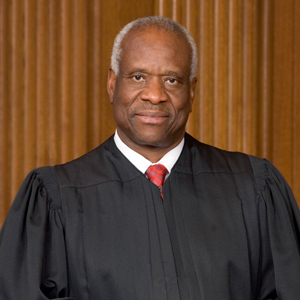Justice Thomas urges Supreme Court to reconsider landmark libel decision

Justice Clarence Thomas.
U.S. Supreme Court Justice Clarence Thomas said Tuesday that the high court should reconsider a landmark libel decision that required defamation plaintiffs who are public figures to show actual malice to recover damages.
The First Amendment case, New York Times v. Sullivan, had defined the actual-malice standard to require the plaintiff to prove the defendant knew the alleged defamatory statement was false or that the statement was made with reckless disregard of the truth.
“New York Times and the court’s decisions extending it were policy-driven decisions masquerading as constitutional law,” Thomas wrote on Tuesday in a concurrence to a cert denial.
“We should not continue to reflexively apply this policy-driven approach to the Constitution,” Thomas wrote. “Instead, we should carefully examine the original meaning of the First and 14th Amendments. If the Constitution does not require public figures to satisfy an actual-malice standard in state-law defamation suits, then neither should we.”
At the time that the First and 14th Amendments were ratified, the common law did not require any kind of heightened standard for public officials to recover damages, Thomas said. “Far from increasing a public figure’s burden in a defamation action, the common law deemed libels against public figures to be, if anything, more serious and injurious than ordinary libels,” Thomas said.
Despite his criticism of the New York Times decision, Thomas agreed with the Supreme Court’s refusal to hear an appeal by a woman who sued Bill Cosby for defamation. A federal appeals court had found that the plaintiff, Kathrine McKee, was a “limited-purpose public figure” who had to show that statements in a leaked letter were made with actual malice.
Thomas said he agreed that the Supreme Court should not accept McKee’s “factbound” appeal of her classification as a public figure. But in an appropriate case, the court should reconsider precedents requiring courts to ask the public-figure question, Thomas said.
“I assume that New York Times and our other constitutional decisions displacing state defamation law have been popular in some circles,” Thomas wrote. “ ‘But this is not the road to salvation for a court of law,’ ” he said, quoting the late Justice Byron White.
The New York Times, the Washington Post and the National Law Journal have coverage of Thomas’ concurrence. The articles point out that President Donald Trump has called for changes in the law to make it easier to sue for libel.
The late Justice Antonin Scalia also had criticized the actual-malice standard. In a 2014 appearance, Scalia said New York Times v. Sullivan was wrong and “the framers would have been appalled,” according to a Los Angeles Times report on his remarks.
But Justices Neil M. Gorsuch and Brett M. Kavanaugh have expressed support for broad libel protections in their appeals court rulings, according to the New York Times.
Write a letter to the editor, share a story tip or update, or report an error.


